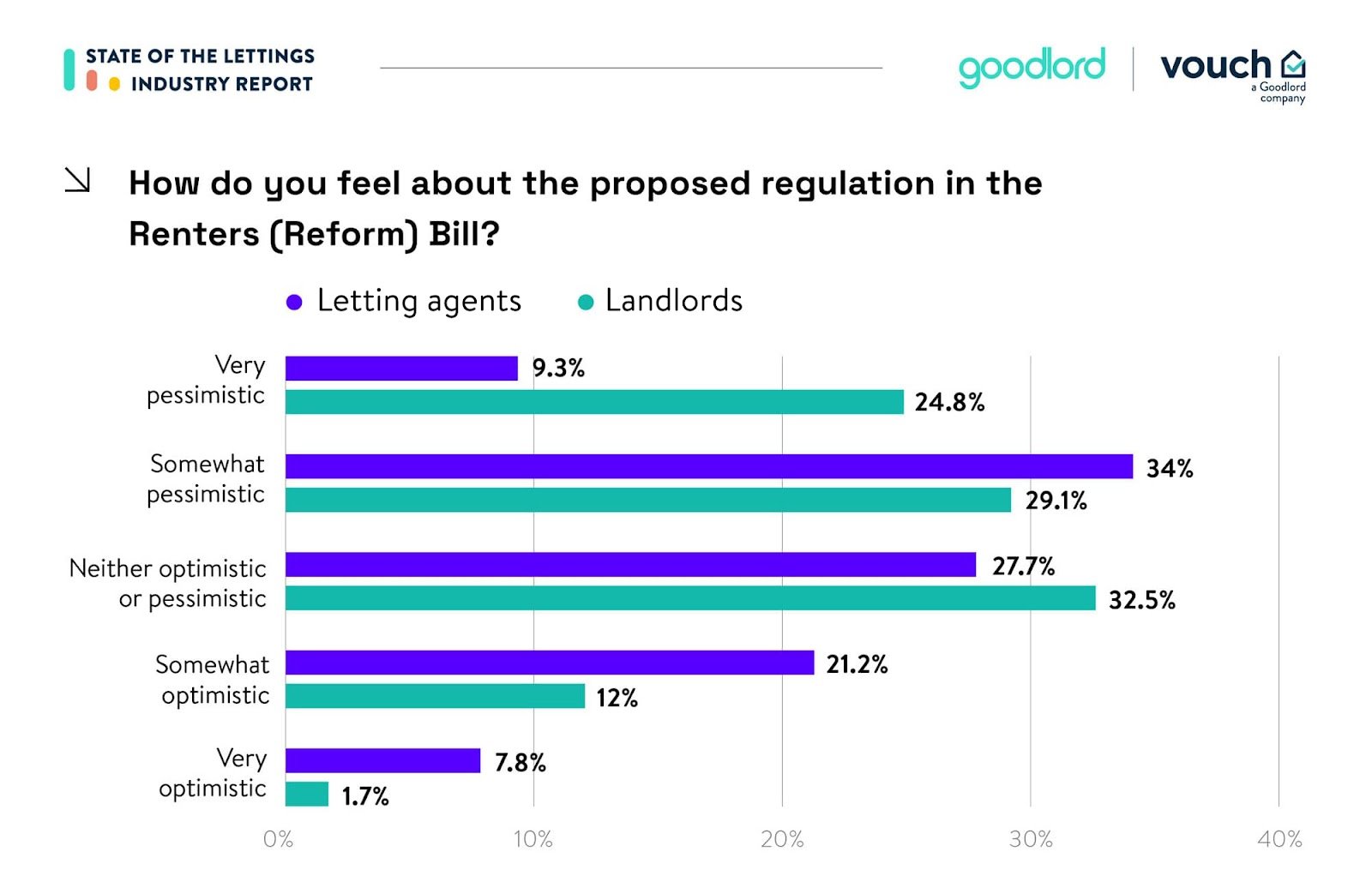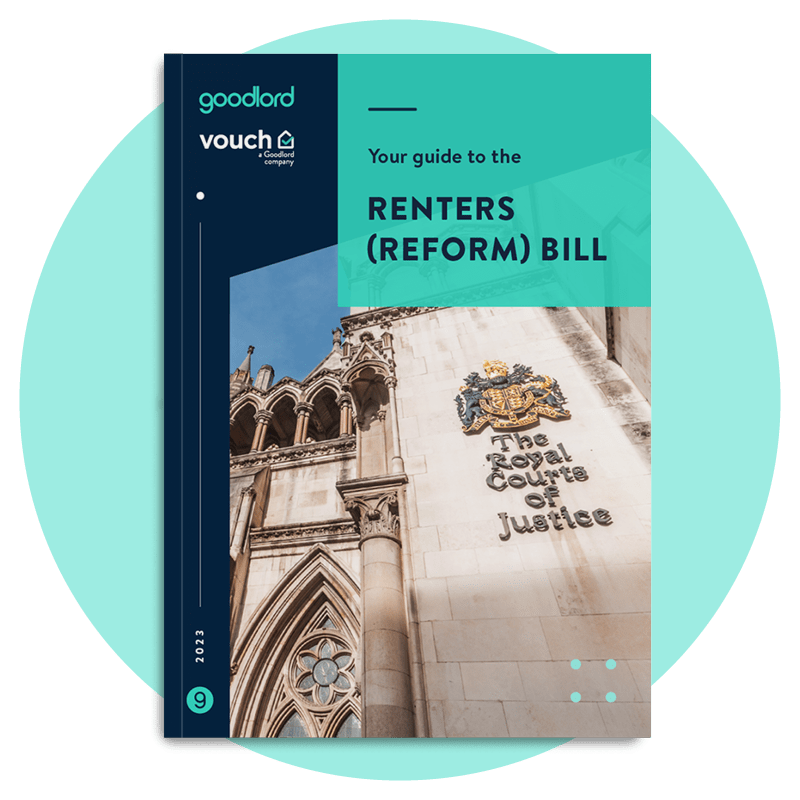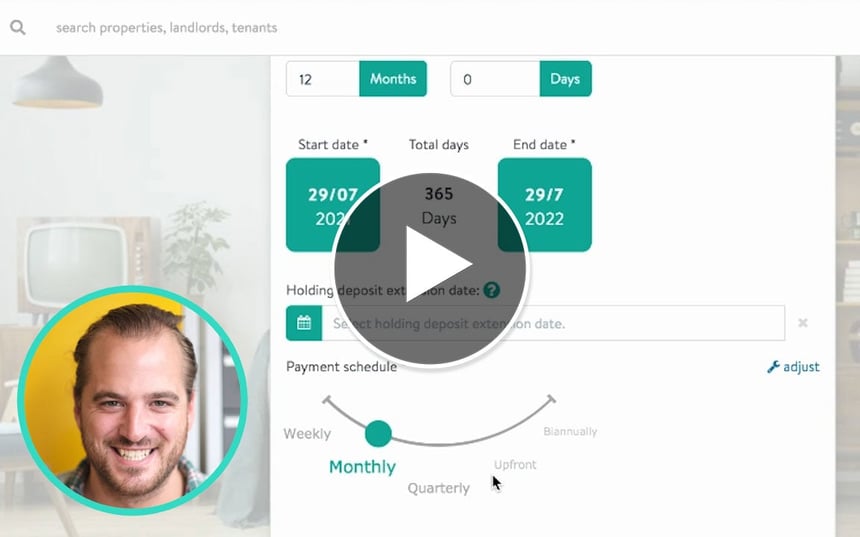Renters (Reform) Bill: Your complete guide
The Renters (Reform) Bill is due for its Third Reading at the end of April, and is on its way to becoming law.
Last update: 18 April 2024
The Renters (Reform) Bill is one of the most significant pieces of legislation for private renters and landlords in the past 30 years. First introduced to parliament on 17 May 2023, the Bill will likely be going through the House of Commons for the final time at the end of April 2024.
🖥️ Watch our video on what agents need to know about the Renters (Reform) Bill
The Renters (Reform) bill has generated diverse responses from MPs, tenants, landlords, and letting agents. The main headline in the media has been the proposed abolition of Section 21 (so-called "no-fault" evictions).
However, there are many other significant proposals in the Renters (Reform) Bill that affect tenants, letting agents, and landlords. This includes the move to rolling tenancies (and therefore the end of periodic 6, 12 or 24 month contracts), new rules for tenants to have pets in lets, the first ombudsman in England for landlords, and a new property proposal.
The bill is now due for its third reading at the end of April 2024. This will be the last chance for MPs to debate the bill. In advance of the debate, the Government has shared its full list of amendments it plans to make. These amendments are significant because they have been signed off by Housing Secretary Michael Gove - which means the government actively wants to make these changes.
This guide covers everything you need to know about the Bill.
Plus, here are some extra resources:
- Sign up to our CPD-accredited Renters (Reform) Bill course
- Print our 'Six things you need to know about the Renters (Reform) Bill' poster for your letting agency's office
- Get the latest news on the Renters (Reform) Bill by signing up to our mailing list
This guide to the Renters (Reform) Bill covers:
- What is the Renters (Reform) Bill?
- Why is the Renters (Reform) Bill being introduced?
- How do letting agents and landlords feel about the changes to come?
- What stage is the Renters (Reform) Bill at?
- What amends have been suggested by the government?
- When will the Renters (Reform) Bill become law?
- Section 21 "no fault" evictions to be abolished
- Periodic tenancies to become standard
- Notice periods for rent increases to be doubled
- Tenants given more rights to keep pets in properties
- A new ombudsman covering all private landlords
- A new property portal for private landlords and tenants
- Applying the Decent Home Standard to the private rented sector
- Bans on renting to families with children or those on benefits to be outlawed
- An overhaul of Rent Repayment Orders (RROs)What's included in the Renters (Reform) Bill?
What is the Renters (Reform) Bill?
The Renters (Reform) Bill is a piece of legislation. It outlines the government's plans to reform the private rented sector (PRS) and level up housing quality.
The bill includes numerous reforms, including banning 'no fault' Section 21 evictions, changing legislation for pets in lets, and introducing a property portal and an ombudsman.
The reforms commit to "bring in a better deal for renters" and marks "the biggest shake-up of the private rented sector in 30 years”.
The plans within the bill were first outlined in a white paper in 2022. The Bill was then published a year later in May 2023.
Over the next 11 months, the bill has been debated through various stages in the House of Commons. It is now predicted that the third reading will happen at the end of April 2024, before it goes into the House of Lords.
Why is the Renters (Reform) Bill being introduced?
The private rented sector is a vital part of the UK housing market. More than four million properties are privately rented, with the numbers of renters having doubled since 2004.
The government says that under current legislation, some renters face "a precarious lack of security" - especially in terms of Section 21 "no fault" evictions. Meanwhile, responsible landlords are facing issues by being "undercut by a minority of criminal landlords".
On the tenant side, it is not uncommon to read stories in the media and online of unfair rent increases, the need for a landlord redress scheme, and the need to crack down on criminal landlords.
🖥️ Watch our video on what agents need to know about the Renters (Reform) Bill
How do letting agents and landlords feel about the changes to come?

The Renters (Reform) Bill divides opinion among property professionals, according to research conducted in Goodlord and Vouch's State of the Lettings Industry Report 2023.
In a survey of more than 800 letting agents and landlords, Goodlord found that landlords are overall feeling pessimistic about the introduction of the new rules - with 25% of those surveyed feeling “very” pessimistic and 29% feeling “somewhat pessimistic”. Only 14% feel optimistic.
On the other hand, 29% of letting agents feel optimistic about the changes.
What stage is the Renters (Reform) Bill at?
The bill is currently going through the House of Commons, following the process:
- First reading: The Renters (Reform) Bill was announced to parliament in May 2023.
- Second reading: This occurred in October 2023. This gave MPs of all parties the opportunity to debate the Bill in parliament. One of the biggest changes at this stage was the announcement that the courts would need to be reformed before Section 21 could be abolished.
- Committee stage: A line-by-line examination of the bill, which occurred at the end of November 2023. The biggest outcomes of this stage were that the Decent Homes Standard would be applied to the sector for the first time, further support to protect the cyclical nature of student tenancies, a ban on landlords and agents from discriminating against tenants on benefits, and an overhaul of Rent Repayment Orders.
- Report stage: This allows MP to debate the bill again for further amendments < The bill has finished this stage
- Third reading: This is the opportunity for final debate on the bill, and will then go to the House of Lords < This will likely occur on 24 April 2024

When will the Renters (Reform) Bill become law?
The Conservative Party has committed to passing the Renters (Reform) Bill into law before the date of the next General Election, which is widely expected to take place in the Autumn of 2024.
However, the Bill must pass through the House of Commons and the House of Lords before achieving Royal Assent. This is when the King officially confirms that the bill will become law.
Michael Gove, Secretary of State for Levelling Up, Housing and Communities, should be taking the bill back to the House of Commons for its third reading during the middle of April.
The third reading is the final chance for Conservative and Labour MPs to debate on the contents of a Bill. MPs are not allowed to come with any further amends or proposals to change the Bill.
However, if and when the Renters (Reform) Bill does become law this year, this does not mean that all policies will come into effect on day one. In some cases, this will become law in stages.
For example, the transition to periodic tenancies will be applied for all new tenancies in stage 'one', and all existing tenancies will transition on a set date, as part of stage 'two'. However, timings are yet to be confirmed.
Meanwhile, not all elements of the bill will be law by day one. For example, the work for establishing an ombudsman and a digital property portal will likely trigger once the bill is passed. The exact timing of when the Ombudsman will come into force will likely be determined by future regulations set by the Secretary of State.
In addition, Section 21 will not be abolished until the courts have been reformed, which leaves timelines more unclear.
What amends have been suggested by the government?
The government has published the list of full amendments, which will be debated in the House of Commons at the end of April 2024.
Significant tabled amendments include:
- As part of the move to periodic tenancies, tenants now will not be able to give two months’ notice to leave a property until they have been in a property for four months. This means a landlord will guarantee that a tenant will stay in a property for six months.
- Section 21 ‘no fault’ evictions cannot be abolished until there has been an examination of whether the courts can handle the increased capacity.
- More protections for student housing to keep up the cyclical nature of the student lettings market. This is to make sure that landlords can guarantee to prospective students that there will be a property to rent for them.
- For requesting a pet, landlords must give or refuse their consent in writing within 28 days of the request being made. The landlord cannot withdraw consent once it is given.
What's included in the Renters (Reform) Bill?
1. Section 21 "no fault" evictions to be abolished
The bill confirms plans to abolish section 21 - a process that enables private landlords to repossess their properties by evicting a tenant. The landlord does not need to give a reason to give notice, hence the dub "no-fault eviction." Instead, landlords will only be able to evict a tenant under reasonable circumstances.
The 2022 government white paper stated that "Removing section 21 will level the playing field between landlord and tenant - empowering tenants to challenge poor practice and unjustified rent increases, as well as incentivising landlords to engage and resolve issues."
Michael Gove further reiterated the government's view that no fault evictions can be "cruel and heartless".
IS SECTION 21 STILL BEING ABOLISHED?
In October 2023, the government announced that the abolition of section 21 would only occur when “sufficient progress has been made to improve the courts." This was an unexpected announcement.
The government has outlined that these improvements should include:
- Digitising the court process
- Exploring how courts can prioritise disputes when anti-social behaviour is involved
- Improving bailiff recruitment
- Providing more advice and counsel to landlords and tenants
Michael Gove has continued to confirm that section 21 will be "outlawed" before the General Election. However, Angela Rayner, deputy leader of the Labour Party, strongly refuted Gove's claims, stating: "These are yet more weasel words from Michael Gove after years of broken promises."
In advance of the bill's third reading, the government published its full list of tabled amendments to the Bill. This included the fact that Section 21 cannot be abolished until it has been established whether the courts can handle the increased capacity of claims.
Under recent revisions, landlords could still evict tenants in certain situations, such as needing the property for themselves or wanting to sell. Tenants who are evicted under these new circumstances may be entitled to local council homelessness support.
Read the full guide to what's changing with the courts process.
why do court processes need to change for section 21 to take effect?
Although the government previously committed to working in partnership with the Ministry of Justice and the HM Courts and Tribunals Service, the commitment to prioritise the courts process over section 21 came slightly unexpectedly.
This concession is likely due to discontent among landlord MPs regarding section 21, a reform that is generally viewed negatively by landlords. By agreeing to focus on reforming the courts first, the government has offered a significant concession to win MP support.
How will section 8 grounds change?
In place of section 21, the bill outlines proposals to strengthen section 8. This will allows a landlord to end a tenancy agreement if they have a legal reason to do so.
The government plans to add a new mandatory ground for repeated rent arrears. This makes eviction mandatory where a tenant has been in at least two months’ rent arrears three times within the previous three years, regardless of the arrears balance at hearing.
There is also a new ground that means landlords can apply section 8 to a tenancy if they wish to sell a property, or if they wish to allow their family members to move into a rental property. This can apply after a tenant has been in a property for at least six months.
Read more about the changes on our dedicated section 8 blog.
Download a free guide to share with your landlords on the changes to sections 21 and 8.
2. A single system of periodic tenancies
The bill confirms the government's ambition to simplify existing tenancy structures. All Assured Shorthold Tenancies (e.g. six, 12, or 24-month contracts) will move onto a single system of periodic ("rolling") tenancies. All tenancies will instead roll by every month, with no specified end date.
Assured Shorthold Tenancies are currently the most standard type of rental agreement in the private rented sector. It is a common process for tenants to enter into a contract of six or 12 months. After this time has elapsed, a decision is usually made to either renew the contract or switch to a periodic (e.g. month by month) payment.
Originally, the proposals outlined that tenants would then need to provide two months’ notice when leaving a tenancy, to "ensure landlords can recoup the costs of finding a tenant and avoid lengthy void periods". However, revised proposals now suggest a mandatory six-month period instead of two.
In addition, landlords would only be able to evict a tenant under "reasonable" circumstances.
Following the report stage of the bill, new proposals from the amendment paper suggest that tenants won't be able to give notice to leave a property agreement until they have lived in the property for at least four months. This will prevent tenants who are in longer-term agreements, from treating a property as a short-term let.
WHAT ABOUT STUDENT TENANCIES?
Student lets are cyclical in nature, often following the same pattern every year, from September until June. There had been widespread worry from student landlords and letting agents that moving student tenancies over to periodic tenancies would cause issues.
During the committee phase, the government added a strengthened ground that will allow a landlord to take a property at the end of the year.
Frankie Malpass, Product Lead at Vouch said: "It’s encouraging to see that this issue has been recognised by the government by the introduction of a process to complete the tenancy at the end of the academic year, ready for a new cohort of students to move in, enabling students to line up their housing in advance.
"However, more specifics will be needed to ensure the concerns of student and student landlords have been truly addressed.”
April 2024, proposals were suggested to make it easier for landlords to evict students at the end of their academic year. This is to ensure students will move out at the end of their tenancy and landlords can fill their property for the next academic year.
Read your full guide to the new system of periodic tenancies on our blog or download our free e-book guide.
3. Notice periods for rent increases to be doubled
Rent increases will be limited to once per year and the minimum notice landlords must provide of any change in rent will be increased to two months.
Will landlords be able to review rents?
The Renters’ (Reform) Bill white paper outlines plans to end the use of rent review clauses, "preventing tenants being locked into automatic rent increases that are vague or may not reflect changes in the market price" and says that "any attempts to evict tenants through unjustifiable rent increases are unacceptable".
However, landlords and agents will be able to raise rents once a year in line with the market rates - similar to the current section 13 rules - with two months' notice of any increase shared with tenants.
The government will publish a new form that would need to be served to tenants to let them know that you plan to increase their rents. If the tenant agrees, they'll simply pay the increased rent.
If the tenant feels that the increase is disproportionate, the government will "make sure that tenants have the confidence to challenge unjustified rent increases through the First-tier Tribunal.
However, it's also expected that the courts will be able to choose to increase rents for tenants, helping to make tenants to do their own research before challenging an increase.
It will also "prevent the Tribunal increasing rent beyond the amount landlords initially asked for when they proposed a rent increase".
4. Tenants given more rights to keep pets in properties
The Renters (Reform) Bill outlines that tenants can request permission to pet in their home and that landlords cannot unreasonably withhold consent.
A landlord must accept or refuse consent by the 42nd day after the date of the request. This can be extended by a week if a landlord asks for further information.
How will landlords be protected if they accept a tenant with pets?
The bill is slightly stricter than the white paper. It indicates that a tenant must provide in writing confirmation that they have acquired insurance for their pet, or that they are willing to pay the landlord reasonable costs to cover the landlord's insurance in case of pet damage.
5. A new ombudsman covering all private landlords
Landlords will be required to join a government-approved ombudsman, regardless of whether they use a letting agent.
A landlord redress scheme would enable a former or current tenant to be able to make a complaint against a landlord, which would then be independently investigated.
Before the bill's second reading in October 2023, the government suggested that it is still looking at different options around how the ombudsman service will be delivered. It is likely part of the government's commitment to reform the courts process by helping with mediation.
What powers would the ombudsman have?
The ombudsman would have powers to "put things right for tenants", including compelling landlords to issue an apology, provide information, take remedial action, and/or pay compensation of up to £25,000.
The government also intends for the ombudsman to be able to require landlords to reimburse rent to tenants where the "service or standard of property they provide falls short of the mark".
The ombudsman’s decision will be binding on landlords, should the complainant accept the final determination and failure to comply with a decision may result in repeat or serious offenders being liable for a Banning Order.
Will joining the ombudsman be mandatory for landlords?
In all cases, it seems that membership will be mandatory. The white paper says that "making membership of an ombudsman scheme mandatory for landlords who use managing agents will mitigate the situation where a good agent is trying to remedy a complaint but is reliant on a landlord who is refusing to engage".
It will also ensure that tenants have access to redress services in "any given situation, and that landlords remain accountable for their own conduct and legal responsibilities".
Read this guide to find out more details about the new private renters' ombudsman.
6. New Property Portal for private landlords and tenants
A new digital property portal will be introduced to "provide a single ‘front door’ to help landlords understand, and demonstrate compliance with their legal requirements."
The government says that "too often tenants find out too late that they are renting a substandard property from landlords who wilfully fail to comply, and councils don’t know who to track down when serious issues arise."
It notes that the portal will also "support good landlords to demonstrate regulatory compliance and to attract prospective tenants."
In the Renters (Reform) Bill amended paper, MP Anthony Mangnall has proposed local authority landlord licensing should end when the property portal is introduced. Currently, this licensing aims to crack down on rogue landlords, but the new amendment would remove the ability for local housing authorities to designate areas to certain subjective licensing schemes and instead only use the property portal.
Amendments in April 2024 suggested further proposals to review council landlord licensing schemes to avoid any possible duplication with this new property portal for landlord registration.
🖥️ Watch our video on what agents need to know about the Renters (Reform) Bill
How will the new property portal for landlords work?
The nature of the portal is yet to be determined, with the government to "conduct extensive testing of potential solutions for the portal, underpinned by user research and engagement with representative groups, to make sure the system works for tenants, landlords and local councils."
The portal should be flexible enough to support future policy developments, "supporting efforts to raise standards in the sector and reduce the number of non-decent rented homes by 50% by 2030." This could include a system where landlords and agents must meet minimum standards before properties can be let.
Will it be mandatory to register properties on the portal?
The portal aims to provide a solution to these issues, with landlords legally required to register their property on the portal and local councils empowered to take enforcement action against private landlords that fail to join the portal.
The portal will "dramatically increase local councils’ ability to enforce against criminal landlords". The government plans to incorporate some of the functionality of the existing Database of Rogue Landlords and Property Agents.
Read this guide to find out more details about the new property portal.
7. Applying the Decent Home Standard to the private rented sector
The white paper - A fairer private rented sector - published in 2022, suggested that there would be the introduction of minimum housing standards requirements that would "require privately rented homes to meet the Decent Homes Standard for the first time".
This was further built upon during the committee stage, with confirmation that a Decent Homes Standard would be applied to the private rented sector for the first time.
The government announced that local authorities would be given more powers to enforce landlords to make properties decent. This includes fines up to £30,000, a banning order, or the ability for tenants to claim up to 24 months worth of rent back.
Read our full blog on the Decent Homes standard to find out more.
8. Bans on renting to families with children or those on benefits to be outlawed
The government has long called for legislation to protect discrimination for people with children and those on benefits. In the committee stage, the government reintroduced this into the bill.
Landlords and letting agents will be banned from discriminating against these groups and will not be able to specify "No DSS" in adverts or prevent people from viewing a property.
However, the BBC has reported that the Scottish and UK governments are planning to work together to implement a law on this topic, to make sure that landlords can't exclude tenants with children or on benefits from renting homes.
However, a spokesperson for the Scottish government has said that the talks "must include a close examination of the UK government's decision to freeze Local Housing Allowance rates at 2020 levels for the third year running", as affordability is "the far more significant barrier to accessing a privately rented home".
9. An overhaul of Rent Repayment Orders (RRO)
A Rent Repayment Order (RRO) means that a tenant or a local authority can go to a tribunal if a landlord commits at least seven offences, including using violence to enter a property and failing to comply with improvement notices. The landlord will need to repay the rent to a tenant if the tenant wins the case.
The bill proposes adding three more offences for landlords, including:
- If a landlord breaches the ombudsman rules
- If a landlord deliberately provides false or misleading information onto the property portal
The maximum Rent Repayment Order (RRO) will also be increased, so a landlord may be liable to pay 24 months rent, rather than 12.
In addition, The committee stage also revealed plans to overturn a case called Rakusen v. Jepsen. In March 2023, the Supreme Court had ruled that a RRO cannot be made against a superior landlord - i.e. the landlord that owns the property in a rent-to-rent agreement.
This article is intended as a guide only and does not constitute legal advice. Visit gov.uk for more information.












